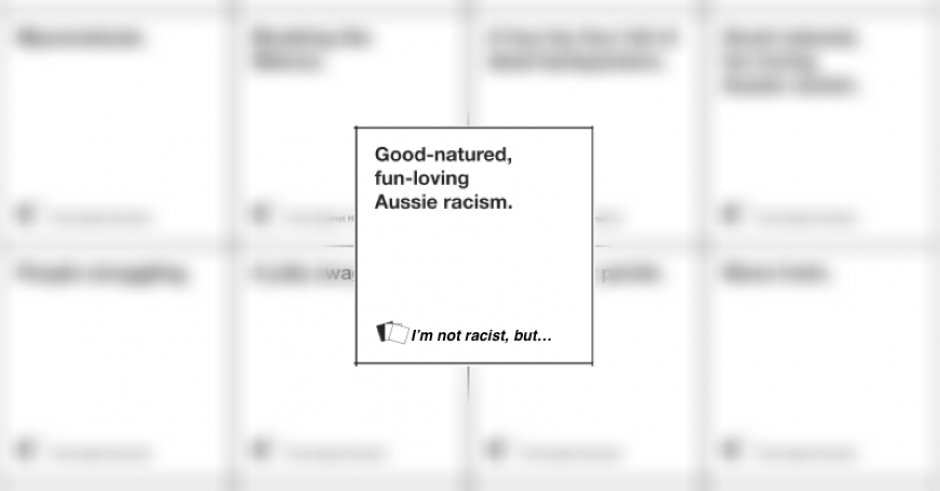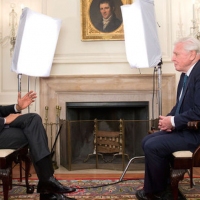 It's Your "Lefty Lynch-Mob"Zaky Mallah and the next step in shutting down Australia's "Left Wing" media.
It's Your "Lefty Lynch-Mob"Zaky Mallah and the next step in shutting down Australia's "Left Wing" media.

Good Natured, Fun Loving, Aussie Racism
Our casual racism is something we need to work on.
Anyone who has played the ludicrously inappropriate yet admittedly hilarious game Cards Against Humanity may recognise the title of this article. It is one of the answer cards in the Australian edition of the game, which I was playing with friends at a pub the other day. That very phrase, in its simplicity, got me thinking about how casual racism is in Australia.
The Macquarie Dictionary defines racism as:
"Behaviour or language based on this kind of belief in relation to a person or persons of a particular race, colour, descent, or national or ethnic origin, either demonstrating an inherent prejudice without specific hostile intent or, alternatively, intended to offend, insult, humiliate, or intimidate."
The phrase that grabs me from that definition is the part about "inherent prejudice without specific hostile intent". If someone were to ask me how I defined racism, this aspect of the concept probably wouldn't have crossed my mind. But it is an inherently important component of how we think about racism and racist actions. It's the good natured, fun loving, Aussie racism that many of us so frequently overlook as normal and morally sound. The odd comment here, the "light-hearted" joke there. I reckon more often than not we fail to acknowledge the harm that these normalised, everyday actions have on certain people or groups of people.
Who's heard the phrase "I’m not racist but..." before? I sure have. Every time that phrase enters my ears, a switch flicks in my head which says, "Alright then, this person is more than likely to say something racist." Prefacing a statement with those four words is effectively telling everyone who'll listen that you're about to make a severe generalisation about a person, or group of people, that is most likely to their detriment.
I would say that most racist actions, words and thoughts are caused by lack of knowledge or understanding. There is simply too much information in the world and in order to categorise and make sense of all this information so our heads don't suddenly spontaneously combust, we make generalisations and stereotypes about people. It makes sense. We can't know everything about every culture in every country in the world - it's simply impossible. In saying that, how we view people, and groups of people, is heavily influenced by mass media. Mass media sometimes creates and frequently perpetuates these oversimplifications to the degree that many of us take it for reality, without a second thought. Australia is a highly literate country (96% literacy rate last time I checked) so the argument that we aren't educated enough to challenge racism doesn't fly. The issue is how we are educated. For many years the Australian government has promoted the idea of multiculturalism, yet this was never genuinely taught in any of my school education? While we are certainly incredibly culturally diverse, the interaction between the myriad of cultures is not nearly as apparent. I believe what this country is severely lacking are platforms for promoting interracial (or intercultural) dialogue.
When intercultural dialogue does occur it is incredibly effective in breaking down cultural barriers, promoting tolerance of our inherent differences, and basically just coming to terms with the fact that we're all humans and we've all gotta try and co-exist on a big blue ball spinning through space. (Not to mention the fact that this coexistence is arguably even more crucial considering the current state of the climate and environment). We are not born racist. We are not born with prejudices. They are instilled in us from our family, our friends, our teachers, our politicians and our media. They are based on generalisations that, while potentially may convey some form of truth in certain areas - are certainly not defining characteristics of people of a specific race, belief, nationality or other.
It's not all doom and gloom though. People have been promoting intercultural dialogue, both formally and informally, for thousands of years. Community groups such as Sixty Thousand Years, adopt the simple aim of "Recognising, celebrating and creating conversations around Australia's history" with the wider aim of "changing the conversation". These community-based projects that aim to promote cultural diversity, understanding and dialogue are crucial, but the scale and reach of these programs is relatively small. These programs shouldn't exist in isolation, but promote cooperation with governments and those in power to deliver a strong message to all Australians - that racism is not OK. Admittedly, it's hard to foster change when News Corp is persuading vast swathes of the Australian public that every Muslim is a terrorist and all asylum seekers are only here to steal our jobs, our homes and our husbands or wives.
Racism never has been, and never will be, a useful tool for any society. It achieves only feelings of fear and hatred. It promotes actions of violence and suffering. Maybe we've romanticised this "good natured, fun loving, Aussie racism" as an inherent part of our convict ancestry in a contemporary culture dominated by white society. Racist views were probably used to justify dispossession of an entire Indigenous population of their land, views which still rear their ugly head in current day Australia. Racist views are now adopted to ostracise peaceful Australian Muslims, in actions such as the Reclaim Australia rallies we witnessed earlier this year. They have been effective in fear mongering by current and previous Australian governments in order to demonise and dehumanise asylum seekers. If we are to see genuine changes to this discourse, we need to take steps to achieve progress.
In the world of online activism, we have a tendency to think too much and complex. Dispelling racism can translate to taking to the streets to oppose Reclaim Australia rallies or to call the government out for ultra-racist policies regarding the closure of remote Indigenous communities in Western Australia. But I would argue that, in this case, progress is much more wholesome in its simplicity. Instead of reading the paper, go and talk to a member of your local community that may be of a different race or have a different cultural background to you. Ask them what they believe and let them justify that, whether you agree with it or not. Better yet, just have a beer and a yarn and leave the cultural differences aside altogether. Genuine human interaction promotes understanding - we're social beings, and we like to get along with each other wherever possible.
Australia, we're in denial about racism. Racism in its extremes, but also in its acceptance in moderate circles. Getting past the denial stage is the first step to changing our ways, and our views. Nobody's perfect, and I often catch myself out by making assumptions or saying something that is blatantly racist. What's important is that we take the time to recognise that racism, in any form, is not good-natured nor is it fun loving. Once we do that we might all think twice before we make that light-hearted joke we used to think was funny.
 It's Your "Lefty Lynch-Mob"Zaky Mallah and the next step in shutting down Australia's "Left Wing" media.
It's Your "Lefty Lynch-Mob"Zaky Mallah and the next step in shutting down Australia's "Left Wing" media.
 When President Barack Obama Met Sir David AttenboroughTwo kingpins discuss the marvels of nature and the future of the planet as we know it.
When President Barack Obama Met Sir David AttenboroughTwo kingpins discuss the marvels of nature and the future of the planet as we know it.